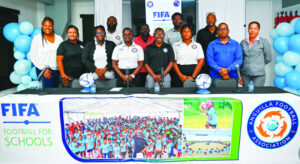
On Monday 15th April, a new program initiative crafted by FIFA in partnership with UNESCO, entitled FIFA Football for Schools, was launched in the presence of key stakeholders and education officials at the Anguilla Football Association’s conference room.
During the launch, Chairperson and Community Services Planner, Mrs. Hyacinth Bradley noted that: “Football for Schools transcends the traditional educational setting, it is not confined to just the classroom walls but it extends and it embraces the community spaces, our homes and any safe space, where children, where youth, where young persons can learn, grow and thrive. We recognized that education is not limited to text book and blackboards, and it’s about nurturing the whole person, the whole individual, fostering their physical, mental and emotional wellbeing. And indeed football for schools is one of the main focus and one of the main drivers of those tenants.”
Furthermore, Football for Schools representative, Ms. Sherri-Ann Roberts offered some brief remarks on the program, stating: “FIFA Football for Schools is an ambitious program run by FIFA, in collaboration with UNESCO which aims to contribute to the education development and empowerment of around 700 million children. It seeks to make football more accessible to both boys and girls around the world by incorporating football activities into the educational system in partnership with relevant authorities and stakeholders.”
“The program has been designed to promote targeted life skills and competencies through football and contribute to the United Nations sustainable development goals and other priorities,” she said. “The program includes an exciting and free digital App for Football Schools accessible via Google Play and Apple App Store.”
The objective of the Football for Schools program, is that it seeks to achieve four outcomes;
• Empower learners, Boys and Girls, with valuable life skills and competencies
• Empower and provide Coach educators with the training to deliver sport and life skill activities
• Build the capacity of stakeholders, schools etc., to deliver training in life skills through football; And
• Strengthen the cooperation between governments and participating schools to enable partnership alliances and inter-sectorial collaboration.
“The Program is not designed to take away from school or teaching or classroom time,” she said, “and in fact [is] intended to compliment the effort of educators and advance education outcomes through assisting government. Football is capable of playing a vital role in the education system and acting as a school of life.”
Additionally, President of the Anguilla Football Association (AFA), Mr. Girdon Connor remarked: “we truly hope that with the implementation of this program it will contribute to the education, the development and the overall empowerment of our young boys and girls.”
“We sincerely hope that they will benefit from the valuable life lessons and of course we hope by the implementation of this program we will continue to maintain strong partnerships with clubs, of government officials, Department of Education and of course all the trainers that would have embarked on the training and development session capacity building through the FIFA training…we really look forward to transferring the skills that will help shape the lives of our young citizens,” he said.








